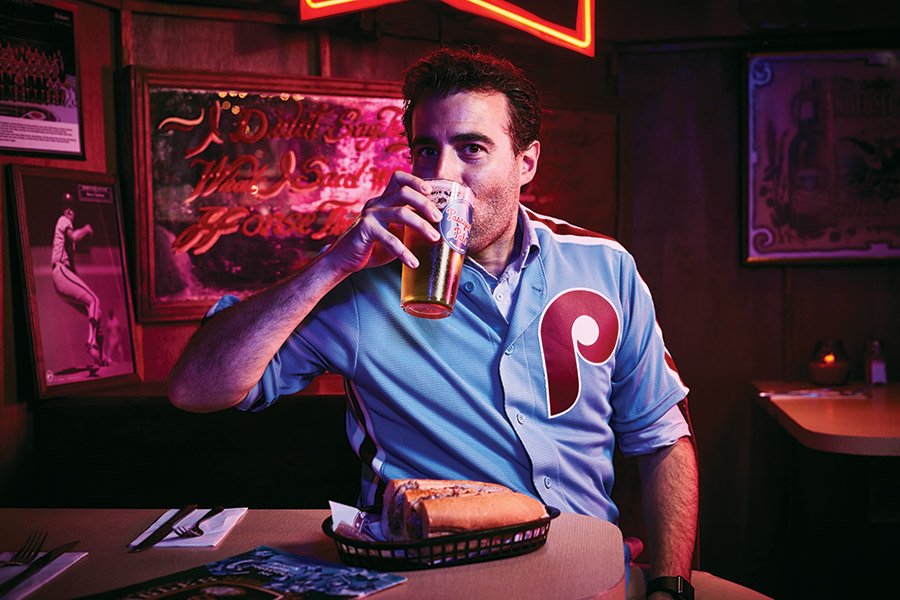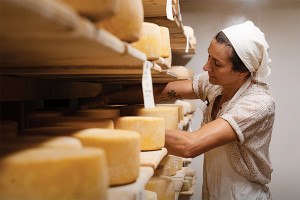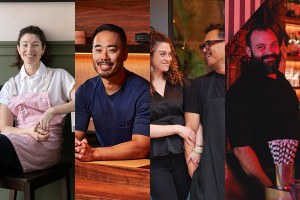A Philly-Themed Bar Called Passyunk Avenue Has Won Londoners’ Cold, Cold Hearts
Why New Jersey expat JP Teti is betting that “Philadelphia” can be a brand.

JP Teti in his bar. Photograph by Jon Enoch
Three isn’t quite enough. Eight is far too many. But that sweet spot between your fourth and seventh beers? That’s when the best bar arguments tend to occur.
I’m taking up a stool in Passyunk Avenue’s narrow front room, coated in the ruddy neon glow of a Budweiser sign on full blast. Firmly ensconced in the five-to-six-pints neighborhood, I’m trying hard not to catch you-look-drunk glimpses of myself in the mirrored back bar, a thrift-shop bit of carved wood decorated with an Eagles clock, a plush Phanatic, and a crumpled dollar bill on which someone has scribbled “TRUST THE PROCESS” in black marker.
“I come from the mystical Central Jersey region,” says Steph Parker, a Drexel grad from Princeton who’s inhabiting the stool to my right.
It’s a revelation that triggers bartender Joey Pasterino, a member of the Froggy Carr Wench Brigade, to prairie-dog-pop his Phillies-capped head up inquisitively. “Central Jersey does not exist.”
Here we go.
“If I had to define it, it’s Trenton and only Trenton,” pitches Pasterino, talking with his hands, the Liberty Bell tattoo above his right elbow on full display.
“That’s a horrible definition,” Parker retorts.
This debate is one I’ve heard righteously dissected in more than one bar. “Hold on. JP’s from Lawrenceville,” says Pasterino, signaling for his boss. “JP, does Central Jersey exist?”
Chasing the Casual Friday ideal in jeans, a madras short-sleeve shirt and a shroud of stubble, Mercer County’s John Paul Teti places his palms on the end of the bar, grinning like a guy who’s legislated this before. “Princeton likes to think it’s this nation-state unto itself, like Vatican City, and the rest of Jersey’s disgusting,” he says.
To Philadelphians, an interaction like this is unremarkable, SOP at any neighborhood tappie where you knock back a few while Rhys Hoskins goes two-for-four. But despite its name, Passyunk Avenue isn’t located below Washington Avenue, in Pennsylvania, or anywhere near the United States. This proudly, pugnaciously Philly place is in the heart of London, an enormous, complicated mega-city whose bars couldn’t be more different from ours.
For all its modish predilections, England’s capital has long taken a shine to American offerings. In opening his self-described dive, Teti is betting that Philadelphia will be attractive to a European audience with no frame of reference, wielding his upbringing to his advantage.
From appearances alone, it looks like Passyunk Avenue was plucked, via giant arcade claw machine, from a zip code near the Linc, airlifted across the Atlantic, and plunked down less than a mile from the British Museum. But delivering an experience that sticks, that’s successful, is more complicated than simply tacking a Sixers jersey to the wall.
When it comes to the setup of public drinking spaces, so much of what we perceive as normal is baffling to the British, and vice versa. But it’s the ways in which we engage with our fellow drinkers that provide the most pronounced contrast between the two towns.
Teti took all of this into meticulous consideration, but to paraphrase the old English soccer chant that’s become an unofficial Philly slogan: If no one likes it, he don’t care. And it’s this exact attitude that London is loving so far.
I already know what the hardest-headed Philadelphians are thinking right now: How can this dude open a Philly bar? Lawrenceville ain’t in Philly! Consider Teti great-grandfathered in. His Abruzzesi ancestors settled around 9th and Dickinson, a few blocks off East Passyunk, in the early 1900s. The clan eventually relocated to Jersey, but the connection to the old neighborhood never wavered. They were down constantly, for baseball games, Mass, family parties or Sunday gravy. They celebrated Teti’s dad’s 70th birthday at his favorite restaurant, Mamma Maria’s on the Ave, and Teti stops into Termini’s for cannoli every time he’s in town.
Teti, 40, first went to England for a year abroad while studying poli-sci at Providence College. After graduation, he dabbled in politics — his mom was once the mayor of Lawrence Township — in D.C. and New Jersey but quickly became disenchanted with the field. He eventually landed a U.K.-based position with Xerox in 2008, and London became home.
Though he excelled at work, directing a division that developed business in Africa and the Middle East, he found corporate culture “depressing.” He earned an MBA from London Business School, married his Pennsylvanian wife, became a British national, settled in southwest London, had two sons, and began spelling words like “flavor” with a U.
It was during his MBA studies that Teti first came up with the idea for the street-food precursor to Passyunk Avenue. As fond of American cuisine as Londoners seemed to be, Teti found most of what he tried lackluster and Disney-fied, often presented by non-Americans — mediocre barbecue, phony Happy Days diner plates, and burgers, burgers everywhere. “People don’t understand how idiosyncratic and ethnic and regional America is,” says Teti.
And Philadelphia’s chief culinary export, he realized, was represented nowhere. Teti knew what a good cheesesteak tasted like, and it was his belief that if he could marry this credibility with a solid product, “Authenticity would resonate.” And if real Philly food intrigued the English, who knows what other parts of home he could sell them?
Teti was still working full-time for Xerox when he debuted Liberty Cheesesteak Co. in 2014, as part of the bustling Saturday market at Duke of York Square. He obsessed when it came to details, laboring over rib-eye sourcing and tinkering with recipes for the roll — sturdy enough to stand up to meat and cheese, but not so crusty that it read French baguette. Cheez Whiz wasn’t readily sold in the U.K., so he linked up with a “shifty go-between in Amsterdam” who charged him a fortune for the shelf-stable contraband. (He now makes his own version.)
He slung the sandwiches from a tented stall, and they were immediately well-received. “It has to be one of the tastiest things I’ve ever had … along with the theatre of watching the food prep as well,” reads one early Yelp review.
It’s that second part that’s important. The operation, with its red-pinstriped branding, was eye-catching, but it was Teti and his staff, who cracked jokes and busted chops in grand grill-guy tradition, who stood out on London’s food scene. Teti would later trade in for a truck, vending at high-traffic Spitalfields, another popular outdoor market.
By then, he’d left Xerox to dedicate himself to the business full-time. His wife, Rebekah Tobias, encouraged it. “Living in London on a single salary is not something we anticipated,” says Tobias, who works for a private equity real estate firm. “But I told him the window of opportunity is now.”
It was clear to Teti that his truck was just the start of something bigger, so he raised £250,000 from a small group of investors. Of them, Juan Miguel Pane Arregui was the only one who’d ever been to Philadelphia. “London has an almost unlimited offer of bars and restaurants,” says the Madrid-based businessman. “But Passyunk Avenue is the only authentic Philadelphia place in London.”
This motivated Teti, for sure. But what inspired him?
“It was the Philly inferiority complex,” he says, stabbing his finger in the air like Jason Kelce, for emphasis. “If you’re a Philly sports fan, you got this big chip on your shoulder about everything. Why isn’t Philly considered? Why isn’t Philly represented? Why are we one of the largest cities in America and the first to be a World Heritage city, and nobody cares about us?”
That authentic enough for you?
It’s an uncharacteristically sunny London Friday the first time I wander into Passyunk Avenue, housed since April in a former kebab shop in the upscale neighborhood of Fitzrovia. My first thought: What a waste of airfare. I just traveled 3,500 miles from Philly, and I’m already back.
Staffers in baseball tees flit about while a muted Phillies game streams on the flat-screens to a dad-rock soundtrack. A chalkboard advertises the Pabst-and-Beam Citywide (a big mover at £6) and Monday-to-Wednesday 50-pence chicken-wing specials. The door to the men’s room is indicated by an autographed photo of Brian Dawkins. Marking that of the ladies: a 1994 People magazine cover featuring Princess Di rocking the hell out of an Eagles jacket.
Later, when I request the password for “Super Bowl LII,” the bar’s wi-fi network, a friendly server with a Northern accent borrows my pen and notepad and writes it down: NickFolesMVP. “Note the capitalization,” he says.
An inspirational post-Lombardi quote from the QB, along with a depiction of the Philly Special, is stenciled onto the kelly green stairwell leading to the basement, naturally dubbed the “Nick Foles Bar.”
“A lot of times, it’s just us explaining everything,” says GM and marketing director Daniel Baczar, a Polish expat who spent a decade of his life at the Jersey Shore. The queries tend to be general: What is Philadelphia? Where is it? And what, exactly, is Whiz?
Teti’s has chosen to address such FAQs by making Passyunk Avenue the most aggressively Philly 1,250 square feet in the sprawling Big Smoke. In addition to putting homesick Americans at ease, the bells and whistles indoctrinate unfamiliar guests, like the college-age couple I spy sitting on the same side of a corner booth, eating lunch in the shadow of a Mike Schmidt jersey. He’s Japanese and she’s Swedish, they tell me as they leave. This was their first-ever cheesesteak, and they dug it.
Executed by Romanian chef Robert Pirvan, Passyunk Avenue’s menu has expanded to feature options like Italian hoagies (Brits sometimes pronounce it “who-gee”), chicken parm, and roast pork with broccoli rabe. Integral to the Philly identity as these specialties may be, it’s the less tangible touches that drive home just how differently our bars operate from the typical London watering hole.
Yanks tend to use the terms synonymously, but there’s a distinction drawn between bars and pubs in London. There, a “bar” is a blanket term — “any room used for the serving of drink with a counter behind which stand the servers,” per beer expert Martyn Cornell’s Strange Tales of Ale — while “pub” means something specific. Public houses were historically built out of inns with rooms for rent; then and now, they operate at more modest hours and serve a narrower (and cheaper) selection than a wider-reaching establishment might. In Central London, they’ve got names like the Blackfriar, Ye Olde Cheshire Cheese, and the Marquis of Granby and are festooned with Victorian glass, dark woodwork, brass fixtures, and other antiquarian touches.
They’re absolutely places to drain a few pints, but the pub is also a go-to for community events, family parties and work functions. If this doesn’t sound all that different from your local, you’re picking up the same thread Teti did — egalitarian gathering places matter, whether you live near Kensington Palace or off a Kensington El stop. “A pub is just as much a part of their tradition as a neighborhood bar would be a part of ours,” he says.
Expats from the States immediately take to Passyunk Avenue, but it’s the intrigued reactions from London’s indigenous drinking population that speak most vividly to the viability of Philadelphia, the Brand.
This bar, by design, does stuff that flummoxes the natives. English drinking is done in rounds, with members of the party taking turns settling up for everyone; Passyunk Avenue happily runs individual tabs. Bar stools are an uncommon sight in London pubs; the bar is usually reserved for walkups. Some Brits have been so thrown by the seating that they earnestly ask Teti if they’re allowed to occupy the stools, and for how long.
“The typical London pub can feel surprisingly isolating,” says beer writer Claire Bullen, a Philly friend of mine who moved to England a few years ago and decided to stick around, earning an MA along the way. “Pubs are the most fun when you come with people you already know.”
But whether it’s the close-quarters layout, the hyper-specific decor, or the steady stream of loquacious foreign customers — one night, I met grads of Upper Dublin High School and Merion Mercy Academy without leaving my seat — it’s clear that Londoners find Passyunk Avenue both perplexing and refreshing.
I once struck up a conversation with four people seated at the Nick Foles Bar: Eric and Georjenna, Temple grads who were visiting, and Georjenna’s sister, Salina, and English brother-in-law, David.
“If you go into a pub in the U.K. and you start talking to someone, they’ll probably look at you like you’re a raving looney,” David told me — gentle real-time analysis I did not pick up on at the time. “It’s just not the done thing.”
I’m so accustomed to rolling out “not all Philadelphians!” rebuttals in defense of the city’s reputation for bluntness that it never occurred to me it could be used as a marketing tool, a novelty at odds with the deeply held convention of English standoffishness. Passyunk Avenue is a place where complete strangers feel comfortable talking to one another, which Teti says shocked his English workers in the early going. But his employees, at Teti’s urging, are the real secret to easing non-Philly guests into the groove. He’s not just hawking hoagies — he’s channeling a way of life.
Once neophytes learn what Philly is, where it’s located, what we eat and whom we root for, a holistic picture of our city’s culture starts coming into focus. It’s then up to Passyunk Avenue’s front-of-house staff to act as ambassadors for our town.
In England, where servers are paid a flat wage and tipping isn’t expected at pubs, “Your job is to take orders, bring them to people, make sure they’re right, take their money and go,” says Teti. “Check your personality at the door. But for us, personality is everything.”
The expectation has rubbed off on Teti’s English staffers, like Rob Findlay, a Newcastle native who identifies similarities between his hardscrabble hometown and Teti’s — despite never having been to Philly. “It’s an underdog city, and many people from the North can relate to that,” he says. “It’s the same as what we’re like.”
It also helps that there are quite a few people with Philly roots in Teti’s employ, including Baczar, Pasterino — the Mummer, who tended bar on South Street for years — manager Jessi Riley and several others. While I hang at the bar for hours, I watch them razz their way through hordes of skeptical Brits, employing everything from inquisitive question-asking to good-natured teasing. This approach, mundane to us, absolutely slays there.
Teti’s pride-driven gamble — that the city he grew up loving can be sold, in all its high-calorie brashness, to a populace renowned for its restraint — is showing returns. He’s in the process of developing a second location, while his first continues to make an impression; on TripAdvisor, Passyunk Avenue is a fixture in the top 10 best-rated restaurants in London, out of a field of more than 18,600 venues.
But there’s another brand of feedback that might be the strongest indicator he’s on the right track. Teti recently received an email from a Blue Bell woman who’d seen images of Passyunk Avenue online. “There’s one photo with a Providence banner hanging behind the bar,” she wrote. “Any chance you could replace Providence and include all the Big Five Schools? Specifically, Villanova (reigning NCAA college champions), or Temple, La Salle, St. Joe’s and Penn.”
If that’s not Philly for you, I don’t know what is.
Published as “London Calling” in the November 2018 issue of Philadelphia magazine.


